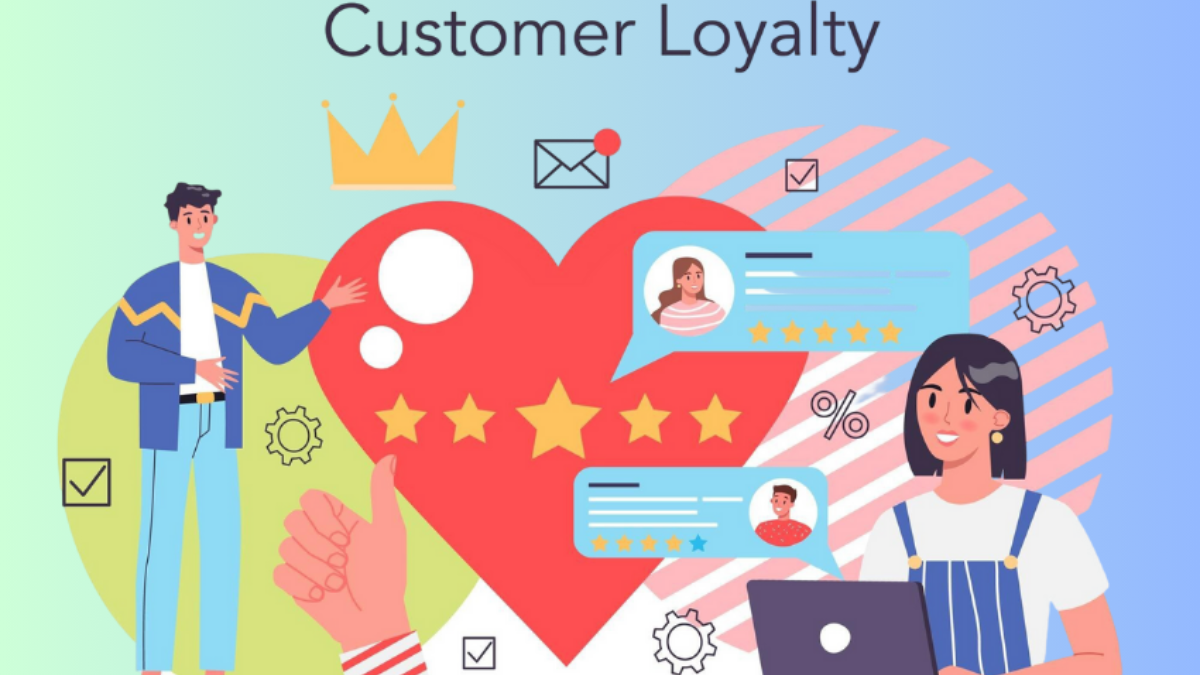In today’s fast-paced digital world, businesses face fierce competition not just in acquiring customers—but in keeping them. The secret to lasting customer loyalty in 2025 lies in evolving with consumer expectations, leveraging technology, and creating personalized, meaningful experiences. As traditional loyalty methods lose steam, a strategic shift toward emotional connection, values-based branding, and omni-channel engagement is emerging as the key to winning long-term customer trust.
Why Customer Loyalty Matters More Than Ever
Customer loyalty isn’t just a buzzword—it’s a foundational business asset. In 2025, customer acquisition costs are at an all-time high, making retention more profitable and strategic than ever.
The ROI of Loyalty
Loyal customers:
- Spend 67% more than new customers
- Are 5x more likely to repurchase
- Are 4x more likely to refer
- Cost significantly less to retain
Customer Expectations Are Changing
Modern customers expect:
- Real-time support
- Personalized recommendations
- Consistency across platforms
- Alignment with their values
To maintain loyalty in 2025, companies must meet and exceed these rising expectations.
The Evolution of Customer Loyalty Programs
From Punch Cards to AI-Powered Insights
Traditional loyalty programs—like stamp cards and point systems—are no longer enough. Today’s loyalty is driven by data and AI-powered customization.
Key Trends:
- Hyper-personalized rewards based on purchase history
- Gamification to make loyalty engaging
- Predictive analytics to offer proactive service
- Tiered programs that incentivize higher engagement
Integration with Digital Wallets & Apps
In 2025, loyalty programs are often built directly into:
- Mobile payment systems
- E-commerce platforms
- Branded apps
This allows customers to access rewards and deals in real time without friction.
Emotional Loyalty vs Transactional Loyalty
What Is Emotional Loyalty?
Transactional loyalty is based on discounts and rewards. Emotional loyalty, on the other hand, is rooted in:
- Trust
- Shared values
- A sense of belonging
In 2025, emotional loyalty drives brand advocacy and resilience even when prices fluctuate or competitors offer promotions.
How to Build Emotional Loyalty
- Storytelling: Share your brand’s mission and values authentically.
- Social Responsibility: Support causes that align with customer beliefs.
- Personalized Communication: Address customers by name, remember preferences, and celebrate milestones.
Personalization: The Cornerstone of Loyalty in 2025
Data-Driven Customer Experiences
With the rise of big data and AI, brands can now offer:
- Customized emails and SMS campaigns
- Personalized product suggestions
- Dynamic website content
Customers want to feel seen. In 2025, businesses that personalize every touchpoint stand out from the crowd.
Real-Time Engagement
Thanks to real-time data analysis, businesses can:
- Offer surprise rewards during peak engagement
- Send notifications on abandoned carts
- Respond instantly via chatbots or live agents
The Role of Omnichannel Engagement
Customers Expect Seamless Experiences
In 2025, customers interact with brands across multiple channels:
- In-store
- Mobile apps
- Social media
- Websites
- Voice assistants
Loyalty depends on a seamless, consistent brand experience across all these platforms.
Unified Customer Profiles
Brands are integrating data across channels to create unified customer profiles. This ensures:
- Tailored offers regardless of platform
- Consistent support
- One-click access to purchase history and loyalty points
Social Media and Community Building
Social Media as a Loyalty Channel
In 2025, social media isn’t just for advertising—it’s a loyalty engine.
What Works:
- Exclusive Instagram or Telegram communities
- Loyalty perks for followers or brand advocates
- Real-time responses to customer concerns
- Encouraging and sharing user-generated content
Building a Brand Community
Brands like Nike, Glossier, and Peloton have created communities that feel like clubs. These customers:
- Feel ownership in the brand
- Participate in brand-related events or forums
- Help promote products through word-of-mouth
Customer Feedback: A Loyalty Multiplier
Asking for Feedback Builds Trust
Soliciting customer feedback shows you care. But more importantly—acting on feedback boosts loyalty.
Best Practices:
- Use surveys at key points (e.g., post-purchase)
- Reward feedback participation
- Implement improvements and communicate them
Continuous Improvement Loop
Loyalty in 2025 relies on agile systems that adapt quickly to customer input. Brands that learn and evolve are seen as trustworthy.
Transparency and Trust
Customers Demand Honesty
Modern consumers value:
- Honest advertising
- Clear return and refund policies
- Transparency about data usage
Companies that mislead or manipulate quickly lose trust—and loyalty.
Data Privacy and Consent
With strict data regulations like GDPR and CCPA, companies must:
- Clearly disclose data usage
- Let customers opt-in or out of data sharing
- Protect customer data at all costs
Trust in data handling is directly linked to brand loyalty.
Employee Experience Impacts Customer Loyalty
Happy Employees = Loyal Customers
Frontline employees shape customer experience. Companies that invest in:
- Training
- Empowerment
- Employee satisfaction
…see a direct increase in customer retention.
Consistent Service Delivery
From call centers to store clerks, consistent, friendly, helpful service reinforces brand reliability.
Emerging Technologies Shaping Loyalty in 2025
AI and Machine Learning
AI is personalizing loyalty by:
- Predicting churn
- Automating tailored campaigns
- Powering chatbots for instant support
Augmented Reality (AR) and Virtual Try-Ons
Retailers are using AR to enhance shopping experiences and build loyalty through:
- Virtual dressing rooms
- 3D product visualization
- Immersive brand interactions
Blockchain for Secure Rewards
Blockchain ensures:
- Tamper-proof reward tracking
- Transparent transactions
- Cross-brand reward systems
Case Studies: Brands Leading Loyalty in 2025
Amazon Prime
Amazon redefined loyalty with Prime by offering:
- Fast shipping
- Exclusive deals
- Streaming and more
Its secret? Value bundling and ecosystem integration.
Starbucks
Starbucks Rewards is now fully integrated with:
- Mobile payments
- Real-time offers
- Personalized drink suggestions
Its success comes from frictionless technology + emotional branding.
Apple
Apple’s loyalty isn’t tied to discounts—it’s built on:
- Seamless ecosystems (iPhone, Mac, AirPods)
- Exceptional customer service (Genius Bar)
- Premium branding
Challenges to Customer Loyalty in 2025
Choice Overload
Too many options create decision fatigue. Brands combat this by:
- Simplifying choices
- Personalizing recommendations
Subscription Fatigue
Customers are overwhelmed with subscriptions. Winning loyalty requires:
- Flexible plans
- Clear value
- Surprise-and-delight strategies
Instant Gratification Expectations
Today’s consumers want instant results. Brands must:
- Speed up delivery
- Reduce wait times
- Offer instant customer support
Conclusion
The secret to lasting customer loyalty in 2025 isn’t just great products or catchy ads—it’s a complex blend of personalization, emotional connection, omnichannel integration, trust, and technology. Businesses that prioritize authenticity, transparency, and continuous innovation will not only retain loyal customers but also turn them into lifelong advocates. Loyalty is no longer a one-size-fits-all strategy—it’s a dynamic, human-centric relationship that evolves with every interaction.
FAQs About Customer Loyalty in 2025
What is the biggest driver of customer loyalty in 2025?
The biggest driver is personalized, emotionally engaging experiences powered by data and technology.
Are loyalty programs still effective in 2025?
Yes, but only if they’re digitally integrated, personalized, and value-driven. Outdated punch cards and basic point systems are losing relevance.
How important is customer service for loyalty?
Extremely important. Consistent, empathetic, and fast customer service is often the deciding factor for long-term loyalty.
Can small businesses compete with big brands in loyalty?
Absolutely. Small businesses can excel in personal touch, community building, and authenticity, which are key loyalty factors.
How does AI help in building customer loyalty?
AI helps by:
- Analyzing customer data
- Predicting behavior
- Automating personalized offers
- Powering chatbots and smart communication



